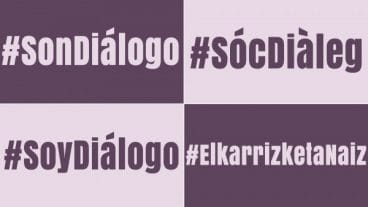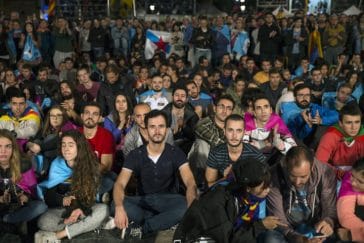 SoyDiálogo (I’m dialogue) is meant as a personal challenge in the face of the situation that has come about in Spain, the proposal to reject every form of violence and to live for the concrete promotion of a culture of dialogue. The challenge is both need and courageous. There have been many efforts in this direction. On the 26th of September, the Focoalre Movement in Spain had proposed a document and gathering of signatures with the intent of promoting opportunities for dialogue, listening and respect. It is an appeal to find peaceful solutions for harmonious coexistence in diversity, recognizing the human dignity of all people and institutions that represent them. The proposal, marked with the hastag #SoyDiálogo, which is in full agreement with the recently relaunched invitation of the bishops to “advance the path of dialogue and mutual understanding,” seems even more timely now, following the results of the referendum vote that opens great unknowns on the future of Catalonia, from Spain and from Europe. The promoters of the effort write: “Dialogue is a powerful tool that makes interest in others possible, entering into their reality, to live it, embrace and, inasmuch as possible, comprehend it. Among us, Focolare members all over Spain, there are people with different cultural and political identities. We’re directly involved in building bridges, convinced that there is an element of truth in the vision and choices of the other. But we condsider diversity to be a positive challenge and enrichment.” “Comments from signers on Twitter: “A signature never decides, but it’s better than crossing your arms and watching the river go by.” “We are as we discuss, enriched by the gift of diversity.” “I believe in dialogue, which presupposes respect, transparency and acceptance that there is a bit of truth in the other tha I can totally embrace.” “It’s not a bad thing to think differently. It’s the way you evolve. It’s the opposite of uniformity and immobility.”
SoyDiálogo (I’m dialogue) is meant as a personal challenge in the face of the situation that has come about in Spain, the proposal to reject every form of violence and to live for the concrete promotion of a culture of dialogue. The challenge is both need and courageous. There have been many efforts in this direction. On the 26th of September, the Focoalre Movement in Spain had proposed a document and gathering of signatures with the intent of promoting opportunities for dialogue, listening and respect. It is an appeal to find peaceful solutions for harmonious coexistence in diversity, recognizing the human dignity of all people and institutions that represent them. The proposal, marked with the hastag #SoyDiálogo, which is in full agreement with the recently relaunched invitation of the bishops to “advance the path of dialogue and mutual understanding,” seems even more timely now, following the results of the referendum vote that opens great unknowns on the future of Catalonia, from Spain and from Europe. The promoters of the effort write: “Dialogue is a powerful tool that makes interest in others possible, entering into their reality, to live it, embrace and, inasmuch as possible, comprehend it. Among us, Focolare members all over Spain, there are people with different cultural and political identities. We’re directly involved in building bridges, convinced that there is an element of truth in the vision and choices of the other. But we condsider diversity to be a positive challenge and enrichment.” “Comments from signers on Twitter: “A signature never decides, but it’s better than crossing your arms and watching the river go by.” “We are as we discuss, enriched by the gift of diversity.” “I believe in dialogue, which presupposes respect, transparency and acceptance that there is a bit of truth in the other tha I can totally embrace.” “It’s not a bad thing to think differently. It’s the way you evolve. It’s the opposite of uniformity and immobility.”  Some considerations from those who believe in dialogue. Girona: “These are strange times, a mix of sadness, helplessness and worry. At the same time it’s clear to me what I should do. In any event I wonder what I can do, with my limited possibilities. I make an effort not to judge. Opportunities for listening with an open mind are never lacking.” A young woman from Seville writes: “With a Catalan friend we try to keep the dialogue open. I take an interest in her family. When you get to know the other person’s background, you can change a bit of your idea and love that person more, even though we have differing ideas.” From Barcelona: “These events offer many possibilities for keeping the dialogue going with those who think like me, and also with those who don’t think like me.” “Up until now I limited myself to praying and cancelling the chain of photos, jokes or doubtful news that circulate online and don’t favour positive feelings,” writes a woman from Toledo. “Then I wondered to myself: what more can I do? I tried to make it known to the people I know in Catalonia that they can count on me to build dialogue. Perhaps that was obvious, but I felt like I had to come out and say it.” Girona writes: “In my opinion when we’re not able to see the bit of truth that is there in the other, we already demonize them. This gives us free rein to write or share whatever incendiary comment that enters our mind. We’re immersed in all this, at times without realizing it, and that’s what’s worse. We forget that our challenge is more heroic and difficult than just making propaganda out of our ideas and disparaging those of others. The real challenge is to build bridges.” From Seville: “I have a lot of friends in Catalonia, brothers and sisters who have decided with me to work at building a new humanity. We share each other’s worries and pain. For this reason, when we write to each other, they’ve felt free to tell me: we hope that the next time, when we see each other again we’ll be independent. And they in turn have listened to me when I answered: I wish for us all that the next time we see one another reason and good thinking will have won.”
Some considerations from those who believe in dialogue. Girona: “These are strange times, a mix of sadness, helplessness and worry. At the same time it’s clear to me what I should do. In any event I wonder what I can do, with my limited possibilities. I make an effort not to judge. Opportunities for listening with an open mind are never lacking.” A young woman from Seville writes: “With a Catalan friend we try to keep the dialogue open. I take an interest in her family. When you get to know the other person’s background, you can change a bit of your idea and love that person more, even though we have differing ideas.” From Barcelona: “These events offer many possibilities for keeping the dialogue going with those who think like me, and also with those who don’t think like me.” “Up until now I limited myself to praying and cancelling the chain of photos, jokes or doubtful news that circulate online and don’t favour positive feelings,” writes a woman from Toledo. “Then I wondered to myself: what more can I do? I tried to make it known to the people I know in Catalonia that they can count on me to build dialogue. Perhaps that was obvious, but I felt like I had to come out and say it.” Girona writes: “In my opinion when we’re not able to see the bit of truth that is there in the other, we already demonize them. This gives us free rein to write or share whatever incendiary comment that enters our mind. We’re immersed in all this, at times without realizing it, and that’s what’s worse. We forget that our challenge is more heroic and difficult than just making propaganda out of our ideas and disparaging those of others. The real challenge is to build bridges.” From Seville: “I have a lot of friends in Catalonia, brothers and sisters who have decided with me to work at building a new humanity. We share each other’s worries and pain. For this reason, when we write to each other, they’ve felt free to tell me: we hope that the next time, when we see each other again we’ll be independent. And they in turn have listened to me when I answered: I wish for us all that the next time we see one another reason and good thinking will have won.”
Put love into practice
Put love into practice




0 Comments